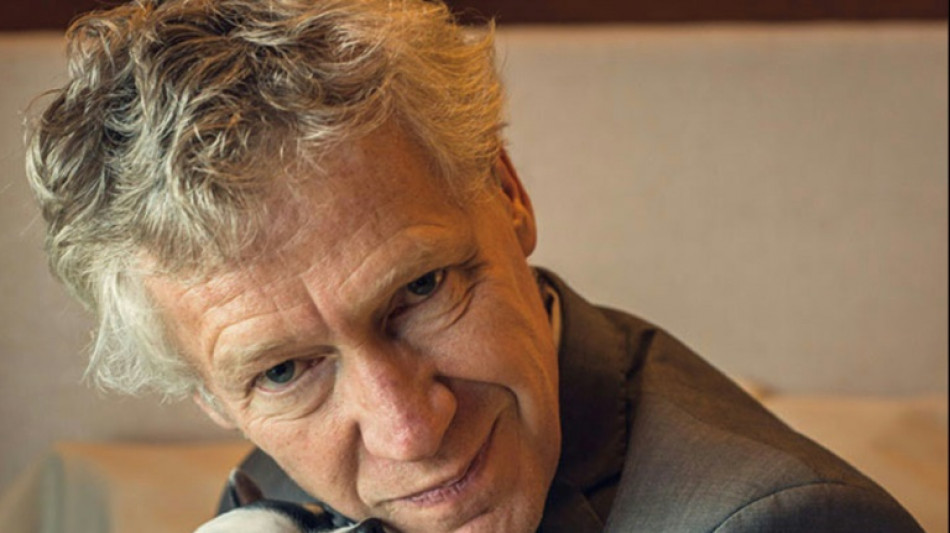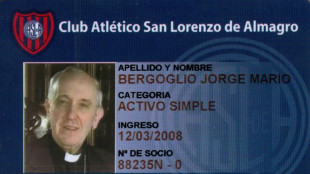
-
 Biles 'not so sure' about competing at Los Angeles Olympics
Biles 'not so sure' about competing at Los Angeles Olympics
-
Gang-ravaged Haiti nearing 'point of no return', UN warns

-
 US assets slump again as Trump sharpens attack on Fed chief
US assets slump again as Trump sharpens attack on Fed chief
-
Forest see off Spurs to boost Champions League hopes

-
 Trump says Pope Francis 'loved the world,' will attend funeral
Trump says Pope Francis 'loved the world,' will attend funeral
-
Oscar voters required to view all films before casting ballots

-
 Bucks' Lillard upgraded to 'questionable' for game 2 v Pacers
Bucks' Lillard upgraded to 'questionable' for game 2 v Pacers
-
Duplantis and Biles win Laureus World Sports Awards

-
 US urges curb of Google's search dominance as AI looms
US urges curb of Google's search dominance as AI looms
-
The Pope with 'two left feet' who loved the 'beautiful game'

-
 With Pope Francis death, Trump loses top moral critic
With Pope Francis death, Trump loses top moral critic
-
Mourning Americans contrast Trump approach to late Pope Francis

-
 Leeds and Burnley promoted to Premier League
Leeds and Burnley promoted to Premier League
-
Racist gunman jailed for life over US supermarket massacre

-
 Trump backs Pentagon chief despite new Signal chat scandal
Trump backs Pentagon chief despite new Signal chat scandal
-
Macron vows to step up reconstruction in cyclone-hit Mayotte

-
 Gill, Sudharsan help toppers Gujarat boss Kolkata in IPL
Gill, Sudharsan help toppers Gujarat boss Kolkata in IPL
-
Messi, San Lorenzo bid farewell to football fan Pope Francis

-
 Leeds on brink of Premier League promotion after smashing Stoke
Leeds on brink of Premier League promotion after smashing Stoke
-
In Lourdes, Catholic pilgrims mourn the 'pope of the poor'

-
 Korir wins men's Boston Marathon, Lokedi upstages Obiri
Korir wins men's Boston Marathon, Lokedi upstages Obiri
-
China's CATL launches new EV sodium battery

-
 Korir wins Boston Marathon, Lokedi upstages Obiri
Korir wins Boston Marathon, Lokedi upstages Obiri
-
Francis, a pope for the internet age

-
 Iraq's top Shiite cleric says Pope Francis sought peace
Iraq's top Shiite cleric says Pope Francis sought peace
-
Mourners flock to world's churches to grieve Pope Francis

-
 Trump says Pope Francis 'loved the world'
Trump says Pope Francis 'loved the world'
-
Sri Lanka recalls Pope Francis' compassion on Easter bombing anniversary

-
 Pope Francis inspired IOC president Bach to create refugee team
Pope Francis inspired IOC president Bach to create refugee team
-
Alexander-Arnold will be remembered for 'good things' at Liverpool: Van Dijk

-
 US VP Vance meets Indian PM Modi for tough talks on trade
US VP Vance meets Indian PM Modi for tough talks on trade
-
Pentagon chief dismisses reports he shared military info with wife

-
 15 potential successors to Pope Francis
15 potential successors to Pope Francis
-
The papabili - 15 potential successors to Pope Francis

-
 Zhao sets up all-China clash after beating 2024 world snooker finalist Jones
Zhao sets up all-China clash after beating 2024 world snooker finalist Jones
-
Ostapenko stuns Sabalenka to win Stuttgart title

-
 Argentina mourns loss of papal son
Argentina mourns loss of papal son
-
African leaders praise Pope Francis's 'legacy of compassion'

-
 Mehidy's five wickets help Bangladesh fight back in first Zimbabwe Test
Mehidy's five wickets help Bangladesh fight back in first Zimbabwe Test
-
'The voice of god': Filipinos wrestle with death of Pope Francis

-
 Prayers, disbelief in East Timor after Pope Francis death
Prayers, disbelief in East Timor after Pope Francis death
-
Real Madrid hold minute's silence as La Liga mourns Pope Francis

-
 World leaders pay tribute to Pope Francis, dead at 88
World leaders pay tribute to Pope Francis, dead at 88
-
World leaders react to the death of Pope Francis

-
 Zimbabwe lead first Test despite Bangladesh spinner Mehidy's five wickets
Zimbabwe lead first Test despite Bangladesh spinner Mehidy's five wickets
-
Vatican postpones sainthood for 'God's influencer' after pope's death

-
 Pope's death prompts CONI to call for sporting postponements, minute's silence
Pope's death prompts CONI to call for sporting postponements, minute's silence
-
Stunned and sad, faithful gather at St Peter's to remember Francis

-
 Asian scam centre crime gangs expanding worldwide: UN
Asian scam centre crime gangs expanding worldwide: UN
-
Davos meet founder Klaus Schwab steps down from WEF board


Frenchman rewarded for lifetime of research into narcolepsy
Emmanuel Mignot is one of the world's leading experts on narcolepsy, a sleep disorder that he finds both "strange" and "fascinating."
The French-born Mignot has dedicated his life to studying the causes of narcolepsy and shedding light on one of the great biological mysteries -- sleep.
His discovery of the genetic and molecular causes of the disorder led to his receiving a prestigious Breakthrough Prize on Thursday along with Japan's Masashi Yanagisawa, who made related findings around the same time.
Because of their discoveries, new treatments for narcolepsy -- which causes people to suddenly fall asleep -- and other sleep disorders are being developed.
About one in every 2,000 people suffers from narcolepsy. Some may experience catalepsy -- a sudden trance-like state.
"I am quite proud because what I have discovered is making an enormous difference for my patients," Mignot said in a telephone interview with AFP. "It's the best reward that one could receive."
The 63-year-old Mignot is a sleep researcher at Stanford University in California.
Thirty years ago, when he was a medical student, Mignot fulfilled his military service requirements in France by coming to Stanford to study a French-made drug that was being used to treat narcolepsy.
At the time, he said, the disease was "virtually unknown" and no one was actively studying it.
He became "completely fascinated."
"I told myself it's incredible, this disease, people fall asleep all the time, we have no idea why, and if we could discover the cause we might understand something new about sleep."
Stanford was already home to a renowned sleep center and its laboratory housed narcoleptic dogs, which Mignot began studying in an effort to find a genetic cause of the disease.
Genome sequencing was very primitive at that time and "everybody told me I was crazy," said Mignot, who currently has an adopted narcoleptic dog called Watson.
"I thought it would take a few years and it ended up taking 10."
In 1999, Mignot found a mutation in the genome of narcoleptic dogs. It was located on membrane receptors in the brain that respond to molecules outside the cell, similar to a lock and a key.
- 'Remake a key' -
The Japanese scientist Yanagisawa, meanwhile, had been studying orphan receptors -- receptors of unknown function -- in mice.
He discovered that a molecule that he named orexin binds to the same receptor Mignot detected as abnormal in dogs.
Mice who were deprived of orexin developed narcolepsy.
Mignot immediately began research on human subjects and found that orexin levels in the brain of narcolepsy patients were zero.
Normally, the molecule is produced in great quantities during the day, especially in the evening, allowing one to fight fatigue.
"You don't make a discovery like this twice in your life," Mignot said. "We found the cause of a disease.
"The advantage, is that we can remake a key," he said, referring to orexin.
For the moment, most patients are treated with a combination of powerful sedatives to help them sleep more soundly and amphetamines to keep them awake during the day.
Mignot said tests using a drug that mimics orexin have been "really miraculous."
Patients are fully awake and "transformed."
The challenge is to develop the right dose to be delivered at the right time.
Several companies, including Takeda of Japan, are working on it, and drugs could be authorized in the next few years.
They could be applied to other patients -- people suffering from depression, for example -- who have difficulty waking up, or to those in a coma.
Mignot meanwhile is studying whether narcolepsy may be caused by a flu virus.
The body's immune system may be confusing a flu virus with the cells that produce orexin and T-cells that fight infection are attacking them as a result.
"I've become interested in how the immune system works in the brain," a field he said is "beginning to explode."
As for sleep, Mignot remains fascinated by it even if he has uncovered one of the great mysteries.
"What is it that sleep does that it is so important that we have to do it every day?" he asked. "It's true that we still don't know."
L.Dubois--BTB



